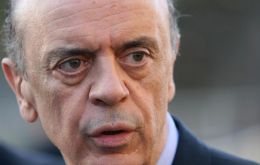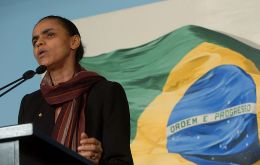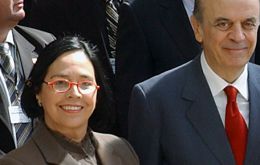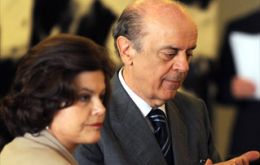MercoPress. South Atlantic News Agency
Tag: Dilma Rousseff
-
Monday, October 25th 2010 - 02:33 UTC
Serra promises “substantial” changes to relations with Mercosur if elected president

Brazil’s presidential opposition candidate Jose Serra promised substantial changes to the country’s foreign policy if elected next Sunday. He specifically mentioned Brazil’s lobbying for a seat at the UN Security Council, the functioning of Mercosur and relations with Cuba and Iran.
-
Sunday, October 24th 2010 - 03:00 UTC
The Economist prefers Jose Serra as a better president but admits the inevitable

Nevertheless it admits that Dilma Rousseff, with the help from outgoing president Lula da Silva, (and his extraordinary political gifts and innate pragmatism), will most probably be the winner.
-
Wednesday, October 20th 2010 - 03:33 UTC
Dilma Rousseff seems back on track and leads with 51% vote intention

The Brazilian ruling party candidate Dilma Rousseff has widened her lead ahead of a presidential runoff vote on October 31, a poll showed, suggesting her campaign may be back on pace after a rough two weeks in which she appeared to be back-pedalling
-
Monday, October 18th 2010 - 21:18 UTC
Brazil’s king-maker prefers to remain ‘independent”: decision favours Dilma

Brazil’s Green Party decided Sunday to remain independent in the presidential runoff election on October 31.
The third-place finisher in the first round, Marina Silva said she would not support either Dilma Rousseff, a former cabinet chief, or the opposition candidate, José Serra, a former governor of São Paulo. -
Monday, October 18th 2010 - 00:09 UTC
Abortion debate in Brazilian campaign has both candidates on the defensive

Brazilian opposition presidential candidate Jose Serra denied his Chilean wife Monica Allende had an abortion and compared the claim with the “defamation” suffered by President Lula da Silva when he was a candidate in 1989.
-
Friday, October 15th 2010 - 06:15 UTC
Serra closes in as presidential debate moves to abortion away from the economy

Brazilian opposition presidential candidate Jose Serra seems to be successfully targeting religious voters as he closes the 14 percentage points of the first round ahead of the runoff at the end of October.
-
Wednesday, October 6th 2010 - 05:26 UTC
Woman power in Brazil: Dilma could still win and Marina holds key of run-off

Brazilian political analysts are trying to explain way Sunday’s electoral party went sour for Dilma Rousseff and her mentor Lula da Silva, the most popular president of the country in the last six decades.
-
Tuesday, October 5th 2010 - 03:06 UTC
Brazil’s Greens confident they hold the key to Lula da Silva’s successor

Brazil’s Green party considers that their presidential candidate Marina Silva and her demands in support of an environmental policy will be decisive in the run off between the ruling Workers Party Dilma Rousseff and runner up Jose Serra from the Social Democracy of Brazil (PSDB).
-
Saturday, October 2nd 2010 - 06:24 UTC
Brazil: Next Sunday General Elections

Though less than a week has passed since the crucial Venezuelan National Assembly elections, all eyes have already turned to Brazil, as it heads into general elections on October 3rd.
-
Friday, October 1st 2010 - 04:27 UTC
Brazil, a rising power, but beware of excessive triumphalism

Opinion polls indicate that the candidate from the ruling Workers Party Dilma Rousseff, hand picked by Lula da Silva, will win Brazil’s presidency next Sunday. A run off is scheduled for a month later if no candidate gets 50% of the ballot, but in any of the two options Ms Rousseff is forecasted to take office next January first .
